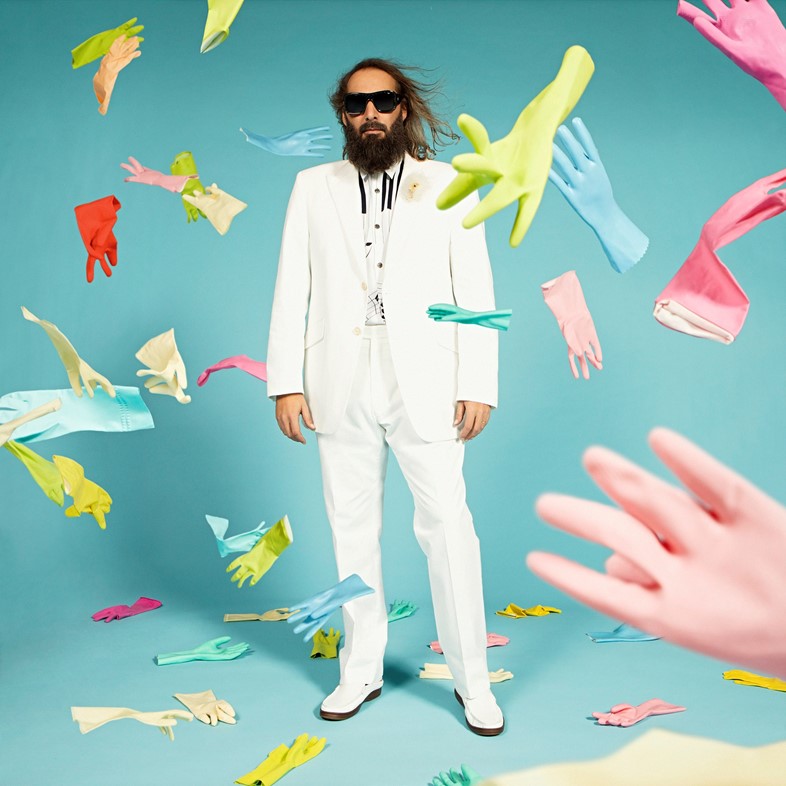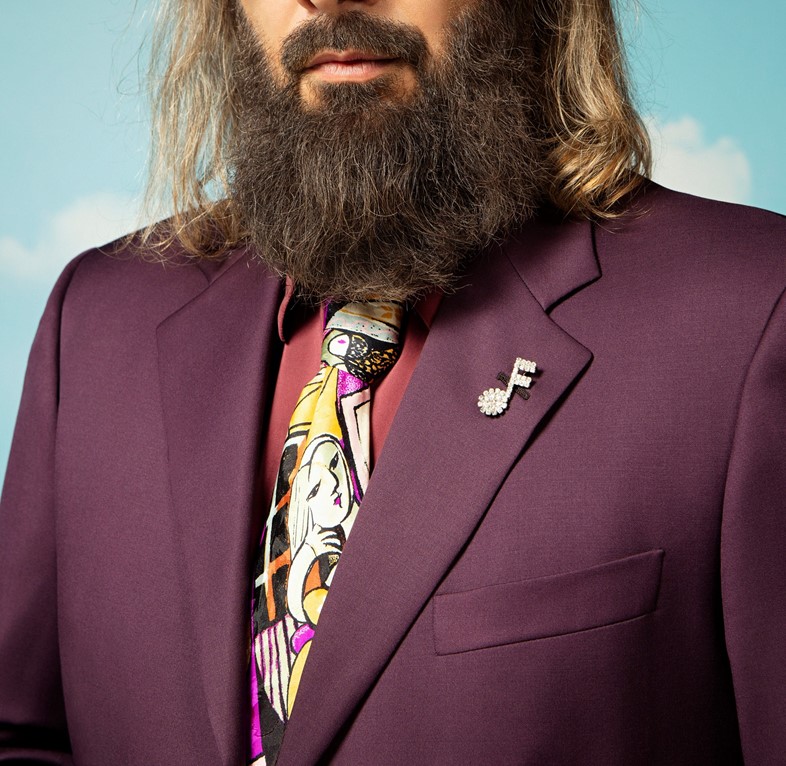Alex Denney meets French music legend Sébastien Tellier, ahead of the release of Domesticated – his first solo record in six years
- TextAlex Denney
In the music video for A Ballet, Sébastien Tellier slinks his way through scenes of domestic life reimagined as a pastel-hued fantasia. Bits of dirty laundry become cascading rose petals; marigold gloves spring to life as rows of Busby Berkeley-like dancers. The twist is that Tellier is no bigger than a toothpick throughout; in one scene, he lounges provocatively in a bowl of breakfast cereal, a supremely chill image reflecting the cult French songwriter’s feelings about life as a married father of two.
“You can find beauty in anything,” says Tellier of the song, a blissed-out R&B slow jam used to tease his first solo record in six years, Domesticated. It’s a hazy, spun cotton-candy set from the one-time wildman of French pop, who got the idea for the record while staring at a toaster back home in Paris. (The name was suggested by director Sofia Coppola, who joked that he was a ‘savage’ who’d been tamed by his newly domestic existence.) “For me the biggest surprise is I found happiness in my family life. ‘Domesticated’ sounds sad, like I’m a slave or something, but if you listen to the record I’m so happy to be domesticated because I feel better than before. Maybe too much freedom kills the freedom, you know?”
Tiny or no, Tellier is kind of a big deal in Francophone pop circles. A self-described “child of French touch” who came up in the wake of Daft Punk’s era-defining success, the musician counts many of the scene’s leading players among his friends. Air invited him on tour after signing him to their Record Makers label in 2001; Daft Punk’s Guy-Manuel de Homem-Christo, who produced his 2008 album Sexuality, declared him “the best singer and composer in France today”. And, sure enough, he’s written some of the best French pop songs this side of his hero, Serge Gainsbourg, from 2005’s piano-driven epic La Ritournelle to delicate mood pieces like Fantino (used to soundtrack Sofia Coppola’s Lost in Translation) and dark-hearted disco (Cochon Ville, a standout from his Jesus-cult concept album My God Is Blue whose music video would land him in all kinds of bother had it been released today).
In everything he does, Tellier brings a naïve sense of wonderment that basks in an aura of the unexpected, from his surreal appearance at 2008 Eurovision, where he rode onstage in a golf cart before crashing out in 18th place, to a performance for members of the Monaco royal family in 2014, of whom he said the following: “They’re big kids, so we were always going to get along.” But is it time to finally grow up? Tellier picked up the story over the phone from Paris.

Alex Denney: Hi Sébastian. I love the name of your new record, Domesticated. It’s not a title you could imagine a big pop star using, is it? Think of the sales figures!
Sébastien Tellier: Haha it’s true, because in a way it’s a very intellectual title. This question of being domesticated, it’s a question about my life because before I was a savage but now I’m a dad – I’m a dad, but also I’m an artist. ‘Domesticated’ sounds sad, like I’m a slave or something, but if you listen to the record I’m so happy to be domesticated because I feel better than before. Maybe sometimes too much freedom kills the freedom, you know? Because OK, the human condition is hard, you have to fight to survive, but at the same time all the pleasure comes from the fight.
AD: I’ve always had a soft spot for songs about domesticity, mainly because it’s not a subject you hear much about in pop. Do you know the song Mrs Bartolozzi by Kate Bush?
ST: No.
AD: It’s a song about a washing machine, essentially. But it’s a clever piece of writing because it’s also very erotic, despite being a song about very everyday things.
ST: Well, you can find beauty everywhere. For example, when I clean the windows at home I feel happy because I just did it, and it’s a very straight emotion – it’s clean, so I’m happy. For me the biggest surprise is I found happiness in my family life. And [this album] is a way to say to people or to myself really, ‘Hey, you’re searching for happiness but happiness could be many different things, but for me my happiness is to be a dad with my wife, my family, and that was a surprise because it was the opposite of what I expected’.
AD: Your last solo record, L’Aventura, was released in 2014, though you’ve worked on several projects since. Was the idea to take a break from solo recording or did it just work out that way?
ST: It’s totally another story for me; I did a few soundtracks and I did the music for an American TV show. I enjoy this kind of work because someone tells me [what they want me to do], and I felt like a young guy at school trying to do my work the best I can! Growing up in France pop music was bad for a long time – apart from Gainsbourg and [Michel] Polnareff, the only people I respected were the guys who did soundtracks, like [Georges] Delerue, Michel Legrand, François de Roubaix. And so for me to do soundtracks, it felt like I was part of a tradition in a way.

AD: You wrote L’Aventura when you were about to become a father for the first time, what’s changed since then?
ST: I needed to make L’Aventura to forget my own childhood and become an adult. And now, six years after, I’m an adult, and I feel more excited by my life because now when I go to the studio it’s precious time, for me it’s really important. I’m always waiting to be a different person [before making] another album, so it felt like the right time to make a record just to show who I am now.
For me this album, as well as being about domesticity, is an expression of my culture as a Frenchman and a Parisian; it’s romantic, it’s sad, it’s nostalgic, but with one eye on the future ... We had a lot of American and English music on the radio growing up, but the arrangements, the soul of my music is very French. And when I listen back to a record like Sexuality or La Ritournelle now I can see it’s music with a very French spirit. But it’s not like I had a choice, it’s just destiny.
AD: The video for A Ballet is perfect. I like the idea of you chilling out on a Multi Cheerio.
ST: Haha yes, because I’m not the worst husband but I’m not the best also. I try, because now in the new society you have to be a perfect husband, but if I can escape a task I’ll do it, like in the video. [Tellier, in a moment of muscle-memory from his previous life, takes a sniff from a bowl of flour in the kitchen at one point.] But I love my wife and I want her to be happy, so!
AD: You seem to have a thing for making yourself small, like on the album covers for Sexuality and L’Aventura. Why’s that?
ST: It’s true, it’s because I’m always lost between the infinite-great and the infinite-small! Because I love science in general and I love space, but I feel lost between the two infinites, so for me to be small it’s like I’m positioning myself halfway. The universe is too big for me; I think it’s important to never forget that we’re just like fournis [ants] in this huge space.
AD: There’s a lot of Auto-Tune on this record, was there something about the songs on there which you thought would lend themselves well to that technique?
ST: For me it was really important because I’d done five albums and I felt I needed to take the next step with my voice. It was an opportunity to create new melodies, because I’m not like Christina Aguilera or Beyoncé or whoever, and with this process it was possible for me to attempt melodies I can’t really do. It was such a pleasure, it really was magical, because I felt so many emotions making this work.
AD: You worked with a number of producers on the record, including Jam City, nit and Philippe Zdar [founding member of French touch duo Cassius who died last year]. Are you glad you were able to feature Philippe’s work on the album?
ST: Yes, I’m so happy because it’s like he didn’t leave us without a goodbye – well, it’s not a goodbye, but it’s a song we did together in the studio. It was great that we spent so much good time together, we were full of ideas, so my last memories of him are in this studio [in Venice]. It was a perfect moment, a perfect time. I have it in my heart and I have it on the record, it means a lot to me.
AD: You came up around a lot of the people involved in the French touch scene, did you feel like a part of that?
ST: I feel like I’m a child of French touch, because it came a little before me. All those French bands like Air, Daft Punk and Phoenix helped me a lot – Phoenix explained to me how to work with computers, and I toured with Air for a long time at the very beginning of my career. I went on a big tour with them just to do nothing, nothing to do but hang out in the tour bus! It was fantastic; I never saw that anywhere else. It’s not fake, French touch really did exist. It wasn’t a rock-star thing – like, ‘Haha, I’m super!’ Everyone was full of respect and kindness for each other. So I’m very happy to be a part of that [story]. But at the same time I do feel like the music I make is different, because Cassius and Daft Punk made music for dancefloor and I never did that, I’m more like a poet, in a way. I see myself less as a musician and more as an artist or a composer.
AD: Did you ever crave success on the kind of scale that Daft Punk achieved?
ST: Yeah, but [I think] my deep personality is too weird to work with other people, because I’m very solitary. All my music is about my brain, my personality, what I feel – it’s like I’m on a little island in my music and I don’t want anybody on it. Of course, it’s good to have friends in the business so you can talk about synths or whatever, but when I’m in the studio I want to be the star, I don’t want to share the limelight. Haha!
AD: Do you miss that sense of community that you enjoyed at the beginning of your career?
ST: Maybe, because like I say the music in France before Daft Punk was bad – super-commercial, super-shitty. But with Daft Punk we had a new opportunity for some light to be [shone] on us, they opened up a corridor to success – not success [in a commercial sense], but success of the French spirit, like we are not just shit, but we exist, you know? We exist. And for me it was beautiful to have this road opened by people like Daft Punk and Philippe.
Domesticated by Sébastien Tellier is out now.











